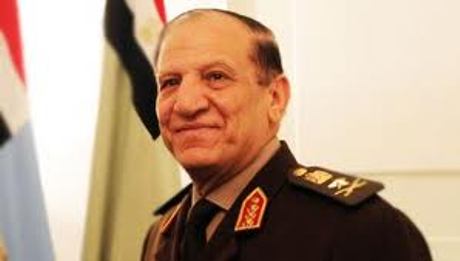
Major General Sami Anan, military Chief of Staff and member of Egypt's ruling military council.
Responding to a formal invitation from Egypt’s Supreme Council of the Armed Forces (SCAF), the representatives of several political parties attended a meeting with council members on Sunday to discuss the regulations that will govern upcoming national elections.
Officials from several political parties had previously registered their dissatisfaction with a new elections law recently announced by the military council. The debate revolves around a hybrid voting process, laid out in the new law, which combines individual candidates and electoral lists on a 50-50 basis.
During the meeting, political representatives voiced concern that the 50 per cent of individual candidacies stipulated by the new law would allow remnants of the former Mubarak regime to contest elections. For their part, SCAF members argued that a system based exclusively on electoral lists would hamper those parties that had not formally joined any coalitions and would therefore not be included on electoral lists.
Legal consultants who attended the meeting further argued that a full electoral list system would violate Egypt’s constitution. SCAF, therefore, has yet to decisively establish the voting system to be employed in upcoming polls.
Regarding fears of ex-regime elements finding their way back into Egypt's post-revolution political landscape, party representatives stressed the importance of enforcing Egypt’s decades-old "treason law," which prohibits individuals found to have sabotaged Egyptian political life from re-entering the political system. SCAF officials, however, argue that the law cannot be activated at this juncture because modifications made to it have yet to be formally recognized by judicial authorities.
Ultimately, no clear-cut decisions appear to have been taken on any of the items on the meeting's agenda.
Ahmed Said, a member of the liberal Free Egyptians Party who attended the meeting, said in a television interview last night that the purpose of the meeting had not been to reach a resolution, but rather to listen to all aspects of the current debate over the controversial elections law.
Said added that Chief-of-Staff Sami Anan had promised to hold more meetings in the near future to continue discussions about the new regulations.
Other issues that continue to stir controversy between SCAF and Egypt’s various political forces were also addressed at Sunday’s meeting, including the ongoing debate over the constitution and the recent restoration of Egypt’s longstanding emergency law.
On the latter issue, council representatives stressed that the unpopular emergency law - which had represented a mainstay of the Mubarak regime - would only be employed against the perpetrators of acts of violence. Regarding the constitution, meanwhile, council members reiterated the unfeasibility of issuing another constitutional declaration - a position that drew criticism from political party representatives who argued that the constitutional announcement was “not sacred text.”
On Sunday night, the head of Egypt’s Supreme Elections Commission announced that candidacy applications for both the Parliament and the Upper House (Shoura Council) would be accepted from 26 September. He further stated that an announcement regarding dates for the actual polling, expected to begin before the end of November, would be made on the same day.
Egypt’s Council of Ministers, meanwhile, is expected to review the new elections law prior to the announcement.
Short link: